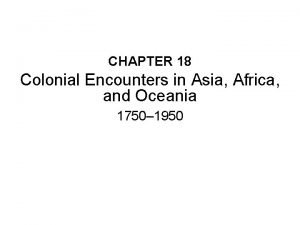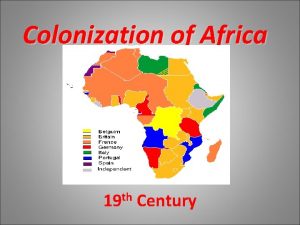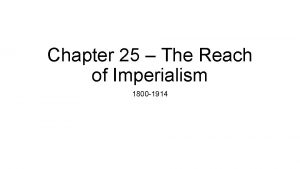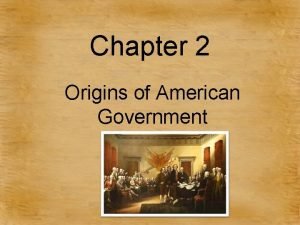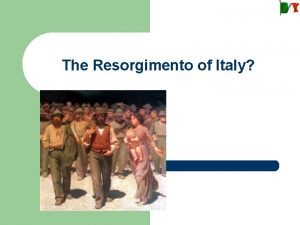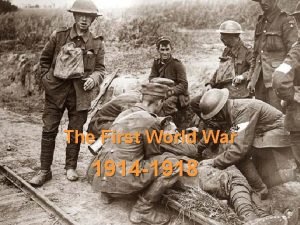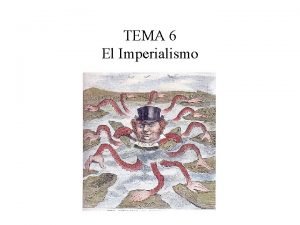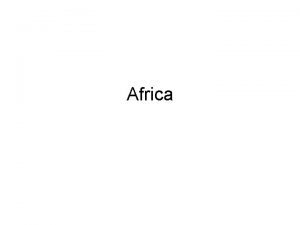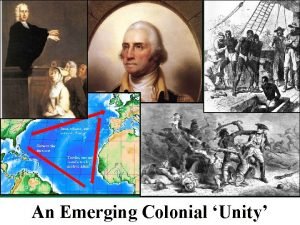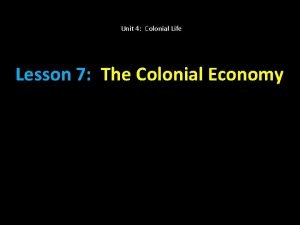Modern Africa Chapter 36 Colonial LegacyWhy is Africa











- Slides: 11

Modern Africa Chapter 36

Colonial Legacy…Why is Africa the Way it is? ? ? • Africans were dependent upon colonial economic help…even after independence • Africans had little knowledge of modern government • Healthcare and education were severely lacking (not modeled by colonial powers) • Boarder disputes raged after colonial powers vacated Africa abruptly after WWII.

“The Great Liberation” “The Great Freedom” • Post WWII many African nations gained independence from European powers. • More than 50 nations gained independence into the 1960 s (Known as the “Great Freedom”) • Nationalist leaders were crucial to the successful independence of African Nations. – Nelson Mandela, Leopold Senghor, Kwame Nkrumah, Jomo Kenyatta…

• Ghana: Formerly the Gold Coast, Kwame Nkrumah was its first prime minister after its independence in 1957. • Kenya: Independence was led by Jomo Kenyatta from about WWII (1949) until he became the prime minister in 1963. In 1964, Kenya became a republic and Kenyatta became president. • Senghor: led independence in Senegal, later becoming its president.

The Many Problems of Modern Africa: 1. Weak/Corrupt Governments, including dictatorship: Sudan, Somalia, Mali, Tanzania… 2. Cultural/Traditional differences: many different languages, belief systems, ethnicities… 3. Civil War/Child Soldiers: Congo, Nigeria, Uganda… Kony 2012 Link

More Problems 4. Economic Instability: experimentation with mixed economies, continued exploitation… 5. Agricultural Problems: lack of resources, fresh water… 6. Desertification: nutrient depleted soil, overgrazing and improper farming techniques have led to an increase in desertification

There are still more… • Lack of Education: There is still little funding for even an elementary level education… • DISEASE: lack of education and resources have led to an increase in disease and death from disease…Especially AIDS. WHY? ? ?

Last One…I Promise • Woman’s Rights: Some progress in Africa. However, the traditional role still exists for many African women. WHY? ? ? _______________________________________

South Africa • Nation was controlled by the Afrikaners (the white minority) • Apartheid, legal separation based on race, was a national policy of South Africa. • Nelson Mandela and the African National Congress worked tirelessly to rid South Africa of legalized racism. • Mandela spent 27 years in prison for his role in Anti. Apartheid movements. • Mandela, with the help of Bishop Desmond Tutu, and South African leader F. W. De Klerk, helped end Apartheid and won the nations first presidential election in 1994

Outlook In Africa • Many African nations continue to see progress. • There are more schools, hospitals, stable governments and economies, as well as more medical technologies and resources… • However, this is progressive, and many Africans still live a traditional life.

YA KEN
 Chapter 18 colonial encounters in asia and africa
Chapter 18 colonial encounters in asia and africa Language in africa
Language in africa Colonial encounters in asia africa and oceania
Colonial encounters in asia africa and oceania Chapter 25 lesson 2 empire building in africa
Chapter 25 lesson 2 empire building in africa Chapter 2 lesson 1 government in colonial america
Chapter 2 lesson 1 government in colonial america Chapter 4 lesson 1 colonial economy
Chapter 4 lesson 1 colonial economy Chapter 5 colonial society on the eve of revolution
Chapter 5 colonial society on the eve of revolution Resorgimento
Resorgimento Postcolonial theory and literature
Postcolonial theory and literature Egyptian floral
Egyptian floral Colonial empires 1914
Colonial empires 1914 Consecuencias políticas del imperialismo
Consecuencias políticas del imperialismo
